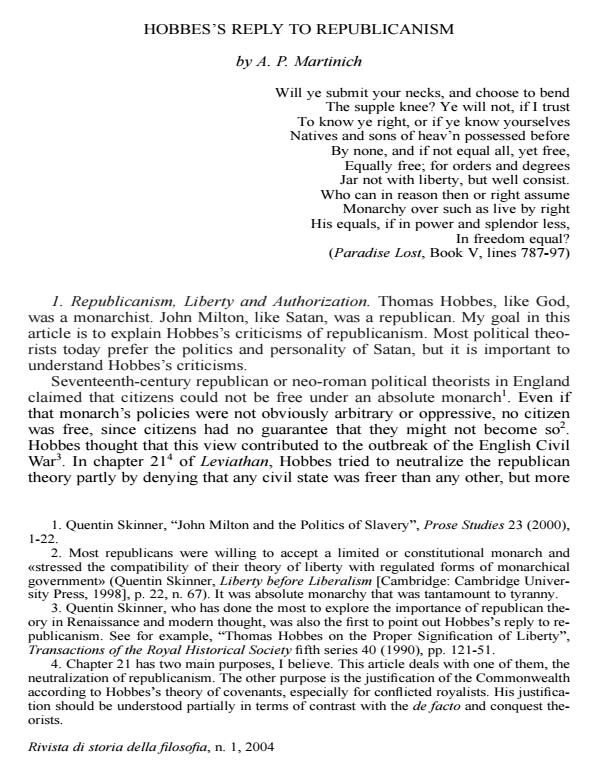Hobbes's reply to republicanism
Titolo Rivista RIVISTA DI STORIA DELLA FILOSOFIA
Autori/Curatori A. P. Martinich
Anno di pubblicazione 2004 Fascicolo 2004/1
Lingua Italiano Numero pagine 13 P. Dimensione file 52 KB
DOI
Il DOI è il codice a barre della proprietà intellettuale: per saperne di più
clicca qui
Qui sotto puoi vedere in anteprima la prima pagina di questo articolo.
Se questo articolo ti interessa, lo puoi acquistare (e scaricare in formato pdf) seguendo le facili indicazioni per acquistare il download credit. Acquista Download Credits per scaricare questo Articolo in formato PDF

FrancoAngeli è membro della Publishers International Linking Association, Inc (PILA)associazione indipendente e non profit per facilitare (attraverso i servizi tecnologici implementati da CrossRef.org) l’accesso degli studiosi ai contenuti digitali nelle pubblicazioni professionali e scientifiche
A. P. Martinich aims at explaining Hobbes’s criticism of Republicanism. Trying to adopt a middle position between subjection and liberty, Hobbes develops a theory of natural liberty which is compatible with both fear and necessity and civil liberty. He thus defines civil liberty as the extent to which a subject is free from laws and obligations, the degree of freedom not being determined by the kind of government a citizen is obliged to. As far as the liberty of states is concerned, Hobbes establishes that there is no more liberty in the one than in the other. Martinich’s demonstration draws very much on §§ 14 and 15 of chapter 21 of Leviathan, that is, on Hobbes’s theory of political obligation, because in those paragraphs Hobbes answers the objections made by republicans to the theory of alienation which he expounded in his Elements of Law and De cive. In Leviathan, Hobbes has abandoned this former theory in seeking to generate obligation out of authorization.
A. P. Martinich, Hobbes's reply to republicanism in "RIVISTA DI STORIA DELLA FILOSOFIA" 1/2004, pp , DOI: